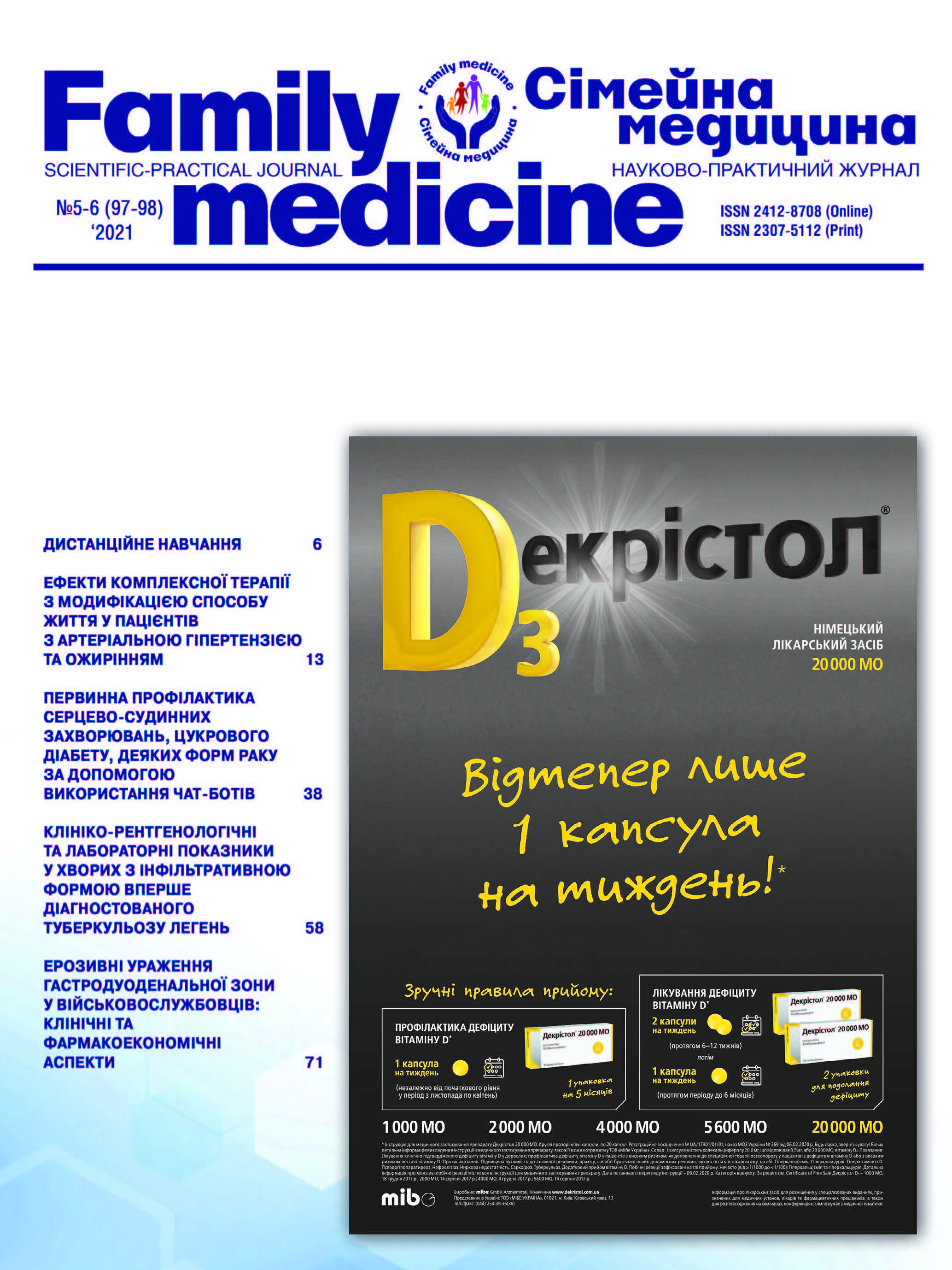Acidic Glycosidases of Leukocytes in Patients with Community-acquired Pneumonia and Their Importance in the Course and Prognosis of the Disease
##plugins.themes.bootstrap3.article.main##
Abstract
At present time pneumonia remains a significant medical and social problem, which is associated with disability and mortality throughout the world. Community-acquired pneumonia (CP) is one of the most common clinical conditions among the adult population and ranks 4th–5th in the world in the structure of causes of death after cardiovascular and oncological diseases, cerebrovascular pathology, trauma and poisoning, and among infectious diseases it ranks first.
The search for biochemical markers of the different forms of pneumonia is of considerable interest both for diagnosis and prediction of the disease clinical course and timely treatment; however, the role of the acid glycosidases and their significance in CP has not been studied.
The objective: the aim of the study: to analyze changes in the enzymatic protective systems of blood in practically healthy individuals (PHI) and patients with CP, to determine their role in diagnosis and prognosis of the disease.
Materials and methods. 30 patients with CP aged 18 to 80 years were examined in Therapeutic Department of the City Clinical Hospital No. 25 in Kharkiv. The diagnosis of CP was established on the basis of epidemiological, clinical, laboratory, radiological data. The patients were with CP were compared with the group of PHI) and examined according to the Medical Standards of the National institute of phthisiology and pulmonology named after F.G. Yanovsky NMAS of Ukraine.
Results. The study revealed that the activity of enzymes was significantly higher in CP patients compared to the PHI group (p<0.05). Significant changes were found in the activity of α- and β-glycosidases, as evidenced by an increase in the activity of β-galactosidase by 2.0 times, and β-glucuronidase – by 3.5 times. An increase in serum antiglucuronidase activity in CP patients can be considered as one of the possible protective mechanisms against the damage effect of β-glucuronidase.
The development of the CP clinical picture was accompanied by changes in biochemical parameters of the blood serum. Results of the study of the serum total proteolytic activity found its increase by 1.4 times in CP patients during the entire study period compared to the PHI group.
The level of the universal indicator of inflammation (total proteolytic activity) was significantly higher in the group of CP patients during the entire observation period, but its maximum increase was observed on the 5th and 10th days. In patients with severe CP, along with the intensification of proteolysis processes, activation of the lysosomal acid phosphatase enzyme in the blood serum waso fund.
Conclusions. In patients with community-acquired pneumonia (CP) increase in the activity of leukocyte acid glycosidases is one of the biochemical markers of a favorable course and good prognosis of the disease. In patients with severe CP, along with the intensification of proteolysis processes, activation of the lysosomal acid phosphatase enzyme in the blood serum was found.
##plugins.themes.bootstrap3.article.details##

This work is licensed under a Creative Commons Attribution 4.0 International License.
Authors retain the copyright and grant the journal the first publication of original scientific articles under the Creative Commons Attribution 4.0 International License, which allows others to distribute work with acknowledgment of authorship and first publication in this journal.
References
Kazancev VA, Udal’cov BB. Pnevmoniya: rukovodstvo dlya vrachey. Sankt-Peterburg: Speclit; 2002. 118 p.
Chuchalin AG, Sinopalnikov AI, Yakovlev SV, i dr. Vnebolnichnaya pnevmoniya u vzroslyih: prakticheskie rekomendatsii po diagnostike, lecheniyu i profilaktike (posobie dlya vrachey). Moskva: GEOTAR-Media; 2010. 53 p.
Rider AC, Frazee BW. Community-Acquired Pneumonia. Emerg Med Clin North Am. 2018;36 (4):665-83.
Eshwara VK, Mukhopadhyay C, Rello J. Community-acquired bacterial pneumonia in adults: An update. Indian J Med Res. 2020;151(4):287-302. doi: 10.4103/ijmr.IJMR_1678_19.
Minakova AL, Preobrazhenskaya ME, Horoshko ID. Kislyie glikozidazyi leykotsitov bolnyih hronicheskimi i ostryimi mielomnyimi leykozami. Voprosy Med Chimie. 1986;32(2):114-8.
Natviga Dzh, redaktor. Limfotsityi: vyidelenie, fraktsionirovanie i harakteristika. Moskva: Medicina; 1980. 280 p.
Levitskiy AP, Denga OV, Makarenko OA, i dr. Biohimicheskie markeryi vospaleniya tkaney rotovoy polosti: metod. rekomendatsii. Odessa: Odeskaya gorodskaya typographia; 2010. 16 p.
Veremeenko KN, Goloborodko OP, Kizim AN. Proteoliz v norme i pri patologii. Kiev: Zdorov’ya; 1988. 200 p.
Lim WS, Baudouin SV, George RC, Hill AT, Jamieson C, Jeune ILe, et al. British Thoracic Society Guidelines for the management of community-acquired pneumonia in adults: update 2009. Thorax. 2009;64(Suppl3):1-55. doi: 10.1136/thx.2009.121434.
Woodhead M, Blasi F, Ewig S, Ieven M, Ortqvist A, Schaberg T, et al. Guidelines for the management of adult lower respiratory tract infections. Eur Respir J. 2005;26(6):1138-80.
Martin-Loeches I, Torres A. New guidelines for severe community-acquired pneumonia. Curr Opin Pulm Med. 2021;27(3):210-5. doi: 10.1097/MCP.0000000000000760.





